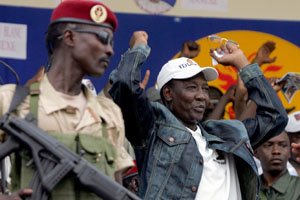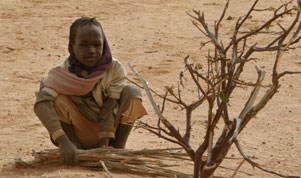[Al-Bashir]
 Chad broke diplomatic relations with Sudan on April 15 after anti-government rebels allegedly based in Sudan and Central African Republic launched a deadly attack on the Chadian capital N'djamena. Sudan has denied Chad's claims that it supports the rebels in its territory and said Chad is sponsoring rebel groups aligned with Deby's ethnic group, the Zaghawa, which have been fighting the Sudanese army. On July 26 Chad and Sudan signed an agreement in N'djamena aimed at normalising relations, in a reunion orchestrated by Libyan leader Moamer Kadhafi (see his website).
Chad broke diplomatic relations with Sudan on April 15 after anti-government rebels allegedly based in Sudan and Central African Republic launched a deadly attack on the Chadian capital N'djamena. Sudan has denied Chad's claims that it supports the rebels in its territory and said Chad is sponsoring rebel groups aligned with Deby's ethnic group, the Zaghawa, which have been fighting the Sudanese army. On July 26 Chad and Sudan signed an agreement in N'djamena aimed at normalising relations, in a reunion orchestrated by Libyan leader Moamer Kadhafi (see his website).Chad and Sudan, locked in mutual acrimony in recent months, on Tuesday decided to "put a definitive end to their differences" and immediately normalise relations, broken off in April. Deby and al-Bashir promised a "solemn commitment to put a definitive end to their differences by immediately normalising diplomatic and economic relations", according to a statement from the Chadian government after a mini-summit between the two leaders.
The meeting took place in N'Djamena as Deby, 54, was reinstated in his consecutive presidential mandate after being reelected on May 3. The men met in Kadhafi's tent after Deby's swearing-in ceremony. The elections that were dismissed by the opposition as rigged.
[Deby celebrates victory]
The detente comes as the Darfur crisis on both sides of the Chad-Sudan border continues to deteriorate. On the Sudan side, eight Sudanese aid workers were killed in July as Khartoum signed a peace agreement with the Sudanese Liberation Army (SLA). In eastern Chad, where over 213,000 Darfuri refugees are camped, attacks continue by Janjawid militants against refugees and aid workers. The instability makes the continued provision of aid extremely precarious for foreign aid workers, whose presence ensures a degree of protection for the refugees, who are the primary target. UNHCR and other aid agencies have denounced these attacks, but Deby's national army has no control over this part of the country.


No comments:
Post a Comment